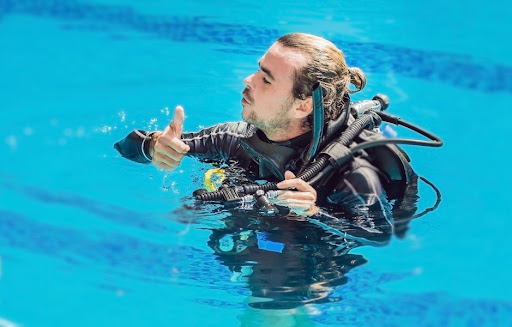
In my time as a diver and my tenure working here at Dive Right In Scuba, there is one question that I get regularly when discussing training with a diver. It is the question of what SCUBA certifications should a diver get? Well, I will start by saying that I’ve never been a “card collector” type of diver, as I tend to spend the bulk of my diving dollars on actually diving. Despite that, I hold rather firmly that there are five certifications that every diver should get(in addition to basic open water of course). In fact, aside from my technical and professional level certifications...these are all that I currently hold. Bear in mind that this is solely my opinion and drawn from my own personal experience, and your experiences may vary. So, let’s dig into my personal “must have” list of certifications, shall we? Ok, awesome.
Advanced Open Water
I will start our discussion on the advanced open water certification by saying that it doesn’t make you advanced by any stretch of the imagination. In fact, you can complete this course and still have a dive log with less than 10 entries in it. With that in mind, some training agencies have revisited the name of the course and certification and often renaming it to something a little closer to what it’s true intent is. So, you may see this course named “adventure diver” or something along those lines as well.
What this course does do is allows you to gain some added dive time and experience while still under the watchful eye of an experienced instructor. In addition, it will give you a glimpse into a few different types of diving scenarios such as deep diving, night diving, and navigation. You can also opt for a couple of dives that may potentially interest you like the underwater naturalist, and wreck diving. It may be a springboard into an avenue of diving that may really interest you. When divers ask me if they should take an advanced open water course, my answer is usually “Why Not?”.
Nitrox Diver
The next course that we’ll talk about is for reasons that aren’t readily evident to many divers. While the Nitrox or enriched air diving course allows you to dive blends of gas with usually up to forty percent oxygen, it does have added benefits. Most basic open water courses skim over gas laws in favor of getting you in the water and diving quickly. If you pick the right instructor and agency for your Nitrox course, you will get a solid foundation for dive planning, gas laws, gas management, and essentially what goes on in the back room where cylinders are filled. While a “Computer Nitrox” course will give you the tools necessary to use a computer to dive enriched air safely, an old school course with tables will further your understanding of diving.
When I talk about the benefits of Nitrox, it is something that you will learn in the course. Simply put, Nitrox can add bottom time to your dives and also an element of safety...provided it is used correctly and by a well trained and diligent diver. So, yeah...take a Nitrox course, you’ll thank me for it.
Rescue Diver
I’ll be honest here, I wasn’t the most excited diver when I went into the Rescue Diver course. I knew I had to take it and I looked at it as a hoop to jump through on my way to becoming a Divemaster. Once I began the bookwork for the course with my instructor I began to see that it wasn’t a “gimme” type, of course, I was actually about to learn something that would potentially keep myself and dive buddy safe. It goes without saying that by the time we actually got wet with the pool work my instructor had all of my attention.
The Rescue Diver course will teach you not only how to rescue your buddy or another random diver. It will also give you a good bit of confidence in your abilities and also the knowledge to be able to get yourself out of a jam underwater if you were to ever find yourself in one. With that in mind, sign up for a Rescue Diver course and approach it with the same enthusiasm that I did(once I realized its value).
Cavern Diver
I hear you grumbling at the heading, “but Aaron, I don’t want to be a cave diver!”. Yeah, I get it and neither did I when the mention of taking a cavern diver course was mentioned by a good friend and instructor. At that time, all I wanted to do was dive deep shipwrecks and explore the history that lies beneath the waves. It was only after an evening of shucked oysters and ice cold beer where my friend explained to me the true value of a cavern course that I went ahead and signed up.
Even if you never plan on diving caves, a Cavern Diver course will provide you with the tools needed to make your diving safer and more enjoyable. You will learn skills like proper buoyancy and trim(not just being able to fin in a straight line but like hover and spin without drifting up and down), gas management, streamlining of equipment, proper equipment configurations(you will have no more dangling hoses), buddy skills, and gas management. Not to mention that the confidence in your diving skills will be on a whole different level. I will warn you, though, taking a cavern course may lead to a love affair of overhead diving environments and eventually cave training. Trust me on this, it happened to me!
Self-Reliant or Solo Diver
Aside from the idea of Nitrox diving in the early 90’s, the Self-Reliant or Solo Diver course has been one of the most controversial ideas in recreational diving. Of course, most can see why since it seems to fly in the face of the idea of buddy diving and all of the hard taught ideas of safe diving being in groups of at least two divers. In recent years, it has become more accepted since the curriculum of the course not only prepares you to be safe while diving alone, it gives you a great deal of the skills needed to be a good dive buddy. Bear in mind that this course is for the more advanced diver, with instructors rarely accepting students without a solid diving foundation and less than 100 dives in their logbooks.
The self-reliant or solo diver course will give the diver a solid knowledge and practice of self-rescue as well as self-reliance. During the course, the diver will be given ample opportunity to practice a number of failures and drills in a controlled environment and under the watchful eye of an experienced instructor. I personally had a great deal of fun and gained a wealth of knowledge during my self-reliant diver course and look back on the experience with fond memories.
While I always strongly recommend that the prudent diver spends their hard earned money on simply diving as much as they can, these five certifications do hold their weight in gold with the knowledge and experience gained from taking them. Whether you want to go into the technical, cave, or stick to the recreational realm...any or all of these courses will give you a solid foundation as a safe diver. If you ever have any questions about dive training, feel free to call on any one of our dive professionals on staff here at Dive Right In Scuba. So, strap on that cylinder and get in the water...I’ll see you on the bottom!
